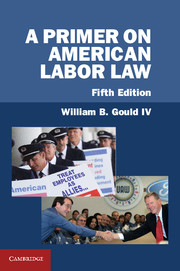Book contents
- Frontmatter
- Contents
- Preface to the Fifth Edition
- Preface to the Fourth Edition
- Preface to the Third Edition
- Preface to the Second Edition
- Preface to the First Edition
- 1 An Overview
- 2 Industrial Relations and Labor Law before Modern Legislation
- 3 The National Labor Relations Act and Related Labor Law
- 4 Unfair Labor Practices
- 5 Establishing the Collective Bargaining Relationship: Organization and Recognition
- 6 Economic Pressure and Bargaining Tactics in the Established Relationship
- 7 Remedies, the Labor Reform Bill of 1978, and the Employee Free Choice Bill of 2009
- 8 Dispute Resolution in the Established Relationship
- 9 The Duty of Fair Representation
- 10 The Public Sector
- 11 Public-Interest Labor Law
- 12 Conclusion
- Index
- References
11 - Public-Interest Labor Law
Published online by Cambridge University Press: 05 June 2013
- Frontmatter
- Contents
- Preface to the Fifth Edition
- Preface to the Fourth Edition
- Preface to the Third Edition
- Preface to the Second Edition
- Preface to the First Edition
- 1 An Overview
- 2 Industrial Relations and Labor Law before Modern Legislation
- 3 The National Labor Relations Act and Related Labor Law
- 4 Unfair Labor Practices
- 5 Establishing the Collective Bargaining Relationship: Organization and Recognition
- 6 Economic Pressure and Bargaining Tactics in the Established Relationship
- 7 Remedies, the Labor Reform Bill of 1978, and the Employee Free Choice Bill of 2009
- 8 Dispute Resolution in the Established Relationship
- 9 The Duty of Fair Representation
- 10 The Public Sector
- 11 Public-Interest Labor Law
- 12 Conclusion
- Index
- References
Summary
Five developments since the advent of modern labor legislation that are important to workers, unions, and employers – although they do not directly involve the balance of power between unions and their members – are the Employee Retirement Income Security Act, the Occupational Safety and Health Act of 1970, employment discrimination law (especially Title VII of the Civil Rights Act of 1964), the common law of wrongful discharge in most of the fifty states of the Union, and issues relating to drug and alcohol testing and sometimes smoking as well.
The Employee Retirement Income Security Act
ERISA is the first comprehensive pension labor law enacted by Congress, although section 302(c)(5) of the National Labor Relations Act provides for the establishment of financial trust funds for the benefit of employees. ERISA does not require the establishment of a pension plan, but it does require disclosure and reporting of financial and other information through the establishment of standards of “conduct, responsibility, and obligation for fiduciaries of employee benefit plans.” It is administered by the Department of Labor and the Internal Revenue Service. The full extent of coverage and protection under the statute is beyond the scope of this chapter, but some of its elements should be mentioned.
- Type
- Chapter
- Information
- A Primer on American Labor Law , pp. 353 - 436Publisher: Cambridge University PressPrint publication year: 2013



